“Which English translation of Crime and Punishment should I read?”
So you want to read Fyodor Dostoevsky’s psychological masterpiece, Crime and Punishment. And you don’t read Russian.
No problem. The novel, originally published in 12 monthly installments in 1866 and as a single volume in 1867, has been available in English since 1885 and widely available in English since 1914. You’ll find a copy in any decent library or bookstore, and if you like reading ebooks, you can download the novel for free because it’s not under copyright. That’s sorted, then.
Not so fast!
As soon as you visit the library or bookshop or click over to Amazon, you realize there are a host of publishers offering a myriad of paperback and hardcover editions and dozens of digital versions. What’s the difference?
The good news is, the book is seldom abridged, so you won’t accidentally settle for a book that’s shorter than you would have wanted. Still, there are a variety of translations available, and opinions differ about their merits. Keep reading to learn how to choose an edition that’s right for you, or jump down to the bottom of this page for a quick-and-dirty recommendation.
Crime and Punishment: Translation History
I count fourteen translations of Crime and Punishment, eight of which are in-print (shown in bold below).
- 1885 – Frederick Whishaw
- 1914 – Constance Garnett
- 1951 – David Magarshack
- 1953 – Princess Alexandra Kropotkin
- 1953 – Jessie Coulson
- 1963 – Michael Scammell
- 1968 – Sidney Monas
- 1985 – Julius Katzer
- 1991 – David McDuff
- 1992 – Richard Pevear and Larissa Volokhonsky
- 2014 – Oliver Ready
- 2017 – Nicolas Pasternak Slater
- 2018 – Michael R. Katz
- 2022 – Roger Cockrell
Nov 2021: By request, the list below is updated to include information on out-of-print translations!
July 2022: Updated to add the new translation by Roger Cockrell!
Crime and Punishment: Translation Comparison
Extracts from different translations of Crime and Punishment have been included below so that you can see how they sound.
Who was Frederick Whishaw?
He was a British writer, historian, and musician. He was born in Russia, grew up in England, moved back to Russia at age 16 to work, and returned to England at age 26. He wrote poetry, novels, stories for children, and books on Russian history. Some of his works, including his translation of Uncle’s Dream AND The Permanent Husband by Dostoevsky, are available at Project Gutenberg. He also translated Dostoevsky’s The Idiot, Humiliated and Insulted aka Injury and Insult, and The Friend of the Family AND The Gambler. If you’re searching for Whishaw’s translations, it’s useful to know that the author’s name was spelled Fedor Dostoieffsky or Fedor Dostoïeffsky.
Extract from the Whishaw translation of Crime and Punishment
One sultry evening early in July a young man emerged from the small furnished lodging he occupied in a large five-storied house in the Pereoulok S——, and turned slowly, with an air of indecision, towards the K—— bridge. He was fortunate enough not to meet his landlady on the stairs. She occupied the floor beneath him, and her kitchen, with its usually-open door, was entered from the staircase. Thus, whenever the young man went out, he found himself obliged to pass under the enemy’s fire, which always produced a morbid terror, humiliating him and making him knit his brows. He owed her some money and felt afraid of encountering her.
It was not that he had been terrified or crushed by misfortune, but that for some time past he had fallen into a state of nervous depression akin to hypochondria. He had withdrawn from society and shut himself up, till he was ready to shun, not merely his landlady, but every human face. Poverty had once weighed him down, though, of late, he had lost his sensitiveness on that score. He had given up all his daily occupations. In his heart of hearts he laughed scornfully at his landlady and the extremities to which she might proceed. Still, to be waylaid on the stairs, to have to listen to all her jargon, hear her demands, threats, and complaints, and have to make excuses and subterfuges in return—no, he preferred to. steal down without attracting notice. On this occasion, however, when he had gained the street, he felt surprised himself at this dread of meeting the woman to whom he was in debt.
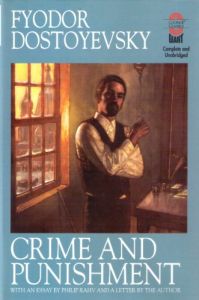
Get the Courage Classics Giant Whishaw translation of Crime and Punishment
Includes an essay by Philip Rahv and a letter by the author. 527 pages. This book is out of print. You may be able to find a used copy for sale online using the links below.
Available as a hardcover (ISBN 9781561387144).
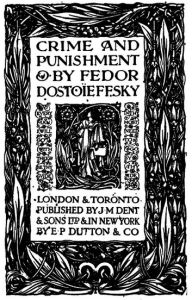
Get the Everyman's Library Whishaw translation of Crime and Punishment
Includes an introduction by Laurence Irving and a list of characters. 1925 reprint of 1911 edition.
Available as a scan digitized by Google from the University of Virgina.

Get the Everyman's Library Whishaw translation of Crime and Punishment
Includes a list of characters. 1921 reprint of 1911 edition.
Available as a scan digitized by Google from the University of Virgina.

Get the Dent/Dutton Whishaw translation of Crime and Punishment
Includes an introduction by Laurence Irving and a list of characters. 1910 reprint of 1908 edition.
Available as a scan.
Who was Constance Garnett?
Constance Garnett translated a TON of stuff from Russian, including Dostoevsky’s Brothers Karamazov, The Idiot, and The Possessed (Demons), and Tolstoy’s War and Peace and Anna Karenina. She is credited with making many Russian works accessible in English. Her contribution to world literature is nothing to sneeze at. Vladimir Nabokov and Joseph Brodsky, nevertheless, accused her writing of being flat and of remaining the same regardless of whom she was translating.
Readers’ opinions vary about whether Garnett’s translation of Crime and Punishment is good. Commentators can’t even agree whether the text sounds Victorian and stilted or surprisingly smooth and modern. Some people say Garnett’s version was thankfully superseded long ago, and others say it never can or will be.
I’m inclined to side with those who uphold Garnett’s translation. Those who praise it sound not just nostalgic but also sensible, and those who criticize it are often motivated to praise newer translations simply because they are newer (or because they sound newer), and perhaps feel it’s safe to attack the work of someone who’s not around to defend it.
Since the translation is old, the copyright has expired, and anyone can republish the text. That means there are a lot of versions with this translation, and they’re cheap.
There are also audiobooks of Crime and Punishment that use the Garnett translation.
If you open a copy of Crime and Punishment and there’s an unsigned “Translator’s Preface” or “Translator’s Note” that starts by saying, “A few words about Dostoevsky himself may help the English reader to understand his work,” then you’ve got a copy of the Garnett translation. You can also cross-check against the wording of the beginning of Chapter 1 (see excerpt below).
About the Garnett translation of Crime and Punishment
- The New Yorker: “The Translation Wars” by David Remnick
“Garnett’s flaws were not the figment of a native speaker’s snobbery. She worked with such speed, with such an eye toward the finish line, that when she came across a word or a phrase that she couldn’t make sense of she would skip it and move on.” - The Jolly Traveller Blog: “Two Crime and Punishment Translations Compared ]Garnett and Magarshack]” by John Malathronas
“She may come handy to those who want a linguistic feel of the times, but I found her simply infuriating.” - Commentary Magazine: “How to Read Crime and Punishment” by Gary Morson
“[N]either [the McDuff translation nor the Pevear and Volokhonsky translation] measures up to the classic rendition of the novel by Constance Garnett.” - Wordsworth Editions: “Gained in Translation” by Tom Griffith
“[A] well-established translation does have the merits of being tried and tested, and of having already appealed to a wide range of discerning readers…. When you read Constance Garnett’s Dostoevsky, or Louise and Aylmer Maude’s Tolstoy, you are joining a continuum of readers going back a century and a half.” - Commentary Magazine: “The Pevearsion of Russian Literature” by Gary Morson
“Students once encountered the great Russian writers as rendered by the magnificent Constance Garnett, a Victorian who taught herself the language and then proceeded to introduce almost the entire corpus of Russian literature to the English language over the space of 40 years, from the 1890s to the 1930s. Her greatest virtues were her profound and sympathetic understanding of the works themselves and a literary artist’s feel for the English language.” - TLS: “Who-knows-he-dunnit?” by Donald Rayfield
“Constance Garnett’s century-old version still flows beautifully: she alone meets the requirement of some translators that no word be used that was introduced into English after 1866 (the date of the original).”
Extract from the Garnett translation of Crime and Punishment
ON AN EXCEPTIONALLY hot1 evening early in July a young man came out of the garret in which he lodged in S. Place and walked slowly, as though in hesitation, towards K. Bridge.2
He had successfully avoided meeting his landlady on the staircase. His garret was under the roof of a high, five-storeyed house, and was more like a cupboard than a room. The landlady, who provided him with garret, dinners and attendance, lived on the floor below and very time he went out he was obliged to pass her kitchen, the door of which invariably stood open. And each time he passed, the young man had a sick, frightened feeling, which made him scowl and feel ashamed. He was hopelessly in debt to his landlady and was afraid of meeting her.
This was not because he was cowardly and abject, quite the contrary: but for some time past he had been in an over-strained, irritable condition, verging on hypochondria. He had become so completely absorbed in himself and isolated from his fellows that he dreaded meeting not only his landlady but anyone at all. He was crushed by poverty, but the anxieties of his position had of late ceased to weigh upon him. He had given up attending to matters of practical importance; he had lost all desire to do so. Nothing that any landlady could do had a real terror for him. But to be stopped on the Stairs to be forced to listen to her trivial, irrelevant gossip, to Pestering demands for payment, threats and complaints, and to rack his brains for excuses, to prevaricate, to lie — no, rather than that, he would creep down the stairs like a cat and slip out unseen.
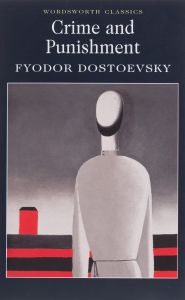
Get the Wordsworth Classics Garnett translation of Crime and Punishment
Includes an introduction and notes by Dr. Keith Carabine, a bibliography, a map, and a list of characters.
Available as a paperback (ISBN 9781840224306, 528 pages).
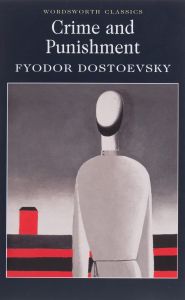
Get the Wordsworth Classics Garnett translation of Crime and Punishment
Includes an introduction and notes by Dr. Keith Carabine, a bibliography, a map, and a list of characters.
Available as an ebook (ISBN 9781848703506).
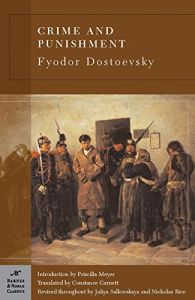
Get the Barnes & Noble Classics Garnett translation of Crime and Punishment
It has been モrevised thoroughlyヤ by Juliya Salkovskaya and Nicholas Rice and includes the following materials: about the author, historical context / chronology, introduction by Priscilla Meyer, list of characters, portrait of author, St. Petersburg map, inspired byナ, comments and questions, further reading.
Available as a paperback (ISBN 9781593080815, 576 pages).
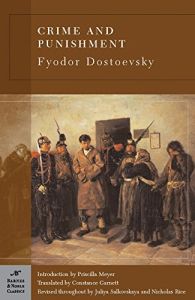
Get the Barnes & Noble Classics Garnett translation of Crime and Punishment
It has been モrevised thoroughlyヤ by Juliya Salkovskaya and Nicholas Rice and includes the following materials: about the author, historical context / chronology, introduction by Priscilla Meyer, list of characters, portrait of author, St. Petersburg map, inspired byナ, comments and questions, further reading.
Available as an ebook (ISBN 9781411432017).
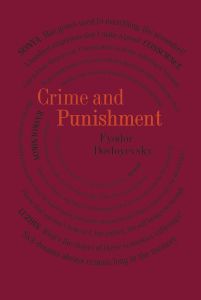
Get the Word Cloud Classics Garnett translation of Crime and Punishment
You can buy an ebook version (ISBN 9781684123537), but I don't know why you would, because this is a showy book designed to look good. The features have nothing to do with the text itself, which is (as far as I can tell) just a standard reprint. Features: clean, modern aesthetic, flexible vinyl covers, specially-designed endpapers, foil-stamping, cute size (5.25? x 7.75?).
Available as a flexibound book (ISBN 9781684122905, 528 pages).
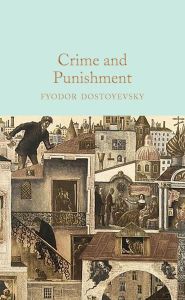
Get the Macmillan Collector's Library Garnett translation of Crime and Punishment
The main thing to note about this edition is its small size (and small font size). It's 4.2 x 1.4 x 6.1 inches, set in Plantin, 8.5 pt / line height 10.5pt. The materials the book is made from are really nice: cloth binding and good paper. It has an afterword by Oliver Francis.
Available as a hardcover (ISBN 9781509827749, 736 pages).
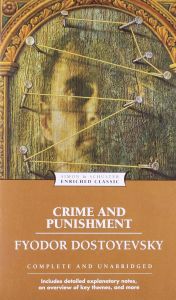
Get the Simon & Schuster Enriched Classics Garnett translation of Crime and Punishment
Includes: an introduction, a chronology of the author's life and work, a timeline of significant events in history, an outline of key themes and plot points, detailed explanatory notes, critical analysis, discussion, a list of recommended related books and films. Supplementary matrial written by Margaret Brantley.
Available as a mass market paperback (ISBN 9780743487634, 704 pages).
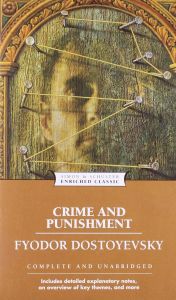
Get the Simon & Schuster Enriched Classics Garnett translation of Crime and Punishment
Includes: an introduction, a chronology of the author's life and work, a timeline of significant events in history, an outline of key themes and plot points, detailed explanatory notes, critical analysis, discussion, a list of recommended related books and films.
Available as an ebook (ISBN 9781416501817).
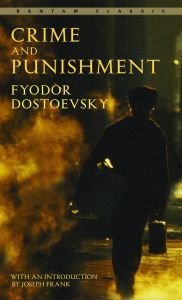
Get the Bantam Classics Garnett translation of Crime and Punishment
Includes an introduction by Joseph Frank.
Available as a mass market paperback (ISBN 9780553211757, 576 pages).
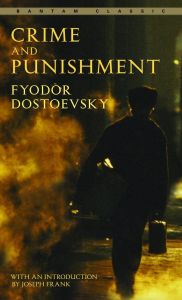
Get the Bantam Classics Garnett translation of Crime and Punishment
Includes an introduction by Joseph Frank.
Available as an ebook (ISBN 9780553898088).
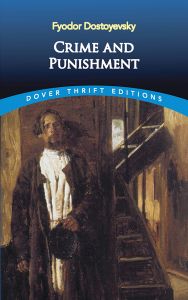
Get the Dover Thrift Garnett translation of Crime and Punishment
Includes an introductory note by editor Susan L. Rattiner and a "selection of the Common Core State Standards Initiative", which is documentation of learning goals relevant to students, teachers, and parents in the US.
Available as a paperback (ISBN 9780486415871, 448 pages).
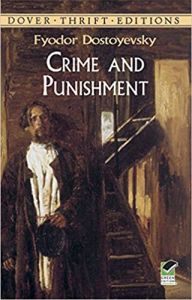
Get the Dover Thrift Garnett translation of Crime and Punishment
Includes an introductory note by editor Susan L. Rattiner and a モselection of the Common Core State Standards Initiativeヤ, which is documentation of learning goals relevant to students, teachers, and parents in the US.
Available as an ebook (ISBN 9780486114859).
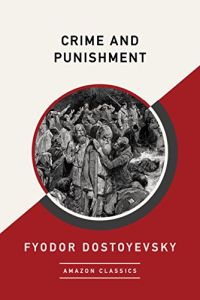
Get the Amazon Classics Garnett translation of Crime and Punishment
Available as an ebook.
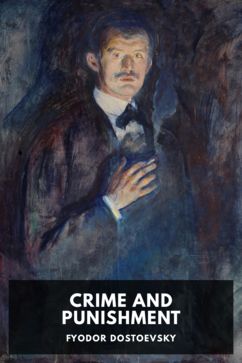
Get the Standard Ebooks Garnett translation of Crime and Punishment
Free! Available in epub, Kindle, Kobo, and Advanced epub formats. Standard Ebooks are professionally edited, professionally designed versions of the Project Gutenberg texts.
Available as an ebook.
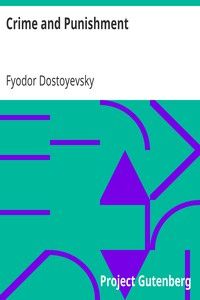
Get the Project Gutenberg Garnett translation of Crime and Punishment
Free! Available in html, epub, Kindle, and plain text formats.
Available as an ebook.
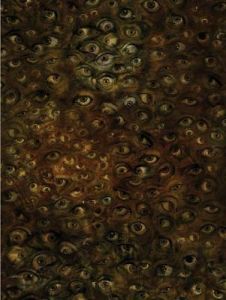
Get the Beehive Garnett translation of Crime and Punishment
Over a hundred color illustrations by Dave McKean and an introduction by Lonny Harrison. Size is 9" x 12". (I think the full text is included, because although there are only 346 pages, Amazon reviews say the font size is tiny.)
Available as a slipcased hardcover (ISBN 9781948886123, 346 pages).
Who was David Magarshack?
He was a British writer. In addition to writing fiction and translating works by Dostoevsky, Tolstoy, Goncharov, Gogol, and Chekhov, he wrote biographies of several Russian authors, including Dostoyevsky. He was born in Riga, Russia (a city in present-day Latvia), and moved to England in his 20s, eventually becoming a naturalized citizen.
In addition to Crime and Punishment, Magarshack translated The Devils aka Demons, The Idiot, The Brothers Karamazov and a volume entitled “Dostoevsky’s Occasional Writings”.
About the Magarshack translation of Crime and Punishment
Bloggers Karamazov: “David Magarshack, the Penguin Archive, and Translating Dostoevsky: A Chat with Cathy McAteer”
This interview with Cathy McAteer, a postdoctoral researcher in translation studies, is worth reading in its entirety. Regarding his motivation, she says: “Magarshack approached his translation work with a keen sense that the ‘real’ Russia had never been accurately conveyed to British readers in preceding translations.” Regarding his techniques, she says: “[H]e tries his hand at vernacularized dialogue; incorporates Anglicized naming practices…; domesticates culture-specific references; avoids all footnotes [and] frequently tries to smooth out syntax.”
TLS: “Who-knows-he-dunnit?” by Donald Rayfield
“Dostoevsky does not suffer much from David Magarshack’s version, standard [from] the 1950s [to 2018], its blandness notwithstanding.”
Washington Post: “The Desperate Hours” by Michael Dirda
“Currently [in 1992, at the time of the release of the Pevear and Volokhonsky translation] the most used editions of C and P have been those in the Norton Critical Edition (Jessie Coulson’s translation) and the Penguin Modern Classics (David Magarshack’s). There have also been versions by Michael Scammell (best known for his biography of Solzhenitsyn), Sidney Monas and recently, David McDuff, this last a Viking hardcover that will, apparently, replace Magarshack as the standard Penguin paperback.”
The Jolly Traveller Blog: “Two Crime and Punishment Translations Compared” by John Malathronas
Between Garnett and Magarshack, John Malathronas much prefers Magarshack. To show why, he supplies three parallel passages: the opening sentence, the first sentence of Chapter 3, and a sentence from the horse dream in Chapter 5.
Extract from the Magarshack translation of Crime and Punishment
ON A VERY HOT EVENING AT THE BEGINNING OF JULY A YOUNG man left his little room at the top of a house in Carpenter Lane, went out into the street, and, as though unable to make up his mind, walked slowly in the direction of Kokushkin Bridge.
He was lucky to avoid a meeting with his landlady on the stairs His little room under the very roof of a tall five-storey building was more like a cupboard than a living-room. His landlady, who also provided him with meals and looked after him, lived in a flat on the floor below. Every time he went out, he had to walk past her kitchen, the door of which was practically always open; and every time he walked past that door, the young man experienced a sickening sensation of terror which made him feel ashamed and pull a wry face. He was up to the neck in debt to his landlady and was afraid of meeting her.
It was not as though he were a coward by nature or easily intimidated, Quite the contrary. But for some time past he had been in an irritable and overstrung state which was like hypochondria. He had been so absorbed in himself and had led so cloistered a life that he was afraid of meeting anybody, let alone his landlady. He was crushed by poverty, but even his straitened circumstances had ceased to worry him lately. He had lost all interest in matters that required his most immediate attention and he did not want to bother about them. Asa matter of fact, he was not in the least afraid of his landlady, whatever plots she might be hatching against him. But rather than be forced to stop on the stairs and listen to all the dreary nonsense which did not concern him at all, to all those insistent demands for payment, to all those threats and complaints, and have to think up some plausible excuse and tell lies — no! A thousand times better to slip downstairs as quietly as a mouse and escape without being seen by anybody.
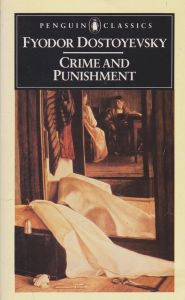
Get the Penguin Magarshack translation of Crime and Punishment
Includes an introduction by the translator. This book is out of print. You may be able to find a used copy for sale online using the links below.
Available as a paperback (ISBN 9780140440232, 564 pages).
Who was Princess Alexandra “Sasha” Kropotkin?
She was a writer descended from the Russian Czar Rurik, born in exile in London, only child of the famous anarchist Peter Kropotkin, who renounced the title of Prince. She returned with her family to Russia in her 30s for a few years before settling in New York, where she built a career by writing about traditional women’s topics (cooking, etiquette, etc.).
About the Kropotkin translation of Crime and Punishment
The Kropotkin translation was published by International Collectors Library, but some ICL books say they are the Garnett translation, and thus are in the public domain, whereas the 1953 Kropotkin text is not. The Kropotkin edition says on the title page that it is a “revised translation arranged for modern reading”. To the best of my understanding, the Kropotkin translation is just Garnett’s translation with some parts changed and some parts left out.
Certainly that seems to be the case for her translation of The Brothers Karamazov. Worldcat lists it as “Fyodor Dostoevsky’s The Brothers Karamazov. Edited by W. Somerset Maugham in a translation revised by Princess Alexandra Kropotkin. Wood cuts by Louis Hechenbleikner. [Based on the translation of C.C. Garnett. Abridged.].”
Extract from the Kropotkin translation of Crime and Punishment
One sultry evening in July a young man emerged from the small furnished lodging he occupied in a large five-storied house in the Pereoulok S-—-, and turned slowly, with an air of indecision, ‘towards the K–— bridge. He was fortunate enough not to meet his landlady on the stairs. She occupied the floor beneath him, an her kitchen, with its usually-open door, was entered from the staircase. Thus, whenever the young man went out, he found himself obliged to pass under the enemy’s fire, which always produced a morbid terror, humiliating him and making him knit his brows. He owed her some money and felt afraid of encountering her.
It was not that he had been terrified or crushed by a misfortune, but that for some time past he had fallen into a state of nervous depression akin to hypochondria. He had withdrawn from society and shut himself up, till he was ready to shun, not merely his landlady, but every human face Poverty had once weighed him down, though of late, he had lost his sensitiveness on that score, He had given up all his daily occupations. In his heart of hearts he laughed scornfully at his landlady and the extremities to which she might proceed. Still, to be waylaid on the stairs, to have to listen to all her jargon, hear her demands, threats and complaints, and to have to make excuses and subterfuges in return -no, he preferred to steal down without attracting notice. On this occasion, however, when he had gained the street, he felt surprised himself at this dread of meeting the woman to whom he was in debt.
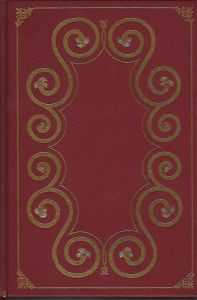
Get the International Collectors Library Kropotkin translation of Crime and Punishment
To the best of my understanding, this is Alexandra Kropotkin's edited, abridged version of the Garnett translation. This edition includes a color frontispiece and black and white illustrations by Marian Larer, silk ribbon bookmark, and decorative endpapers. Has a synthetic leather cover with gold decoration. 408 pages. This book is out of print. You may be able to find a used copy for sale online using the links below.
Available as a hardcover.
Who was Jessie Senior Coulson?
She was a British lexicographer who worked on the Oxford English Dictionary and complied a Russian-English dictionary and a translator of Russian works by Dostoevsky, Turgenev, Gorky, and Chekhov.
About the Coulson translation of Crime and Punishment
The Coulson translation of Crime and Punishment was first published by Oxford University Press in 1953 with the subtitle “A Novel in Six Parts and an Epilogue”. It included an introduction by the translator and a list of characters, and had a map of St. Petersburg printed on the endpapers.
Norton published a critical edition in 1964, a revised critical edition in 1975, and a third edition in 1989. They all say they are “edited by George Gibian”. To the best of my knowledge, this means he chose the essays to be included and added notes, but did not alter the wording of Coulson’s translation. The third edition includes a preface by Gibian, a list of characters, a map of St. Petersburg, content from Dostoevsky’s notebooks and letters, a passage from an early draft, 30 essays, a chronology of his life, and a selected bibliography.
The preface in the 3rd edition states:
“The translation of the novel by Jessie Coulson represents accurately, in contemporary English, Dostoevsky’s nineteenth-century Russian original. It distorts neither through modernization nor through Victorianisms, and it is readable in its own right, instead of sounding like a translation.”
The Coulson translation was also reprinted in the World’s Classics series starting in 1980 and the Oxford World’s Classics series in 1998, reissued in 2008. An introduction and notes by Richard Peace were added in 1995. To the best of my knowledge, Peace did not alter the text of the translation.
The Norton and Oxford editions are all out of print. There are no in-print editions of the Coulson translation.
Extract from the Coulson translation of Crime and Punishment
Towards the end of a sultry afternoon early in July a young man came out of his little room in Stolyarny Lane and turned slowly and somewhat irresolutely in the direction of Kamenny Bridge.
He had been lucky enough to escape an encounter with his landlady on the stairs. His little room, more like a cupboard than a place to live in, was tucked away under the roof of the high five-storied building. The landlady, who let him the room and provided him with dinners and service, occupied a flat on the floor below, and every time he went out he was forced to pass the door of her kitchen, which nearly always stood wide open. He went past each time with an uneasy, almost frightened, feeling that made him frown with shame. He was heavily in debt to his landlady and shrank from meeting her.
It was not that he was a cowed or naturally timorous person, far from it; but he had been for some time in an almost morbid state of irritability and tension. He had cut himself off from everybody and withdrawn so completely into himself that he now shrank from every kind of contact. He was crushingly poor, but he no longer felt the oppression of his poverty. For some time he had ceased to concern himself with everyday affairs. He was not really afraid of any landlady, whatever plots he might think she was hatching against him, but to have to stop on the stairs and listen to all her chatter about trivialities in which he refused to take any interest, all her complaints, threats, and insistent demands for payment, and then to have to extricate himself, lying and making excuses—no, better to creep downstairs as softly as a cat and slip out unnoticed.
See screenshot of the Coulson extract.
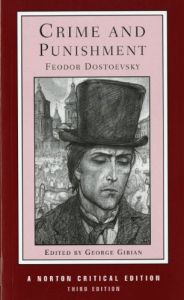
Get the Norton Coulson translation of Crime and Punishment
Includes a preface by George Gibian, a list of characters, a map of St. Petersburg, content from Dostoevsky’s notebooks and letters, a passage from an early draft, 30 essays, a chronology of his life, and a selected bibliography. This book is out of print. You may be able to find a used copy for sale online using the links below.
Available as a paperback (ISBN 9780393956238, 708 pages).
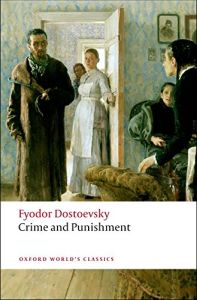
Get the Oxford World's Classics Coulson translation of Crime and Punishment
Includes an introduction and notes by Richard Peace, a bibliography, a chronology, a map, and a list of characters. Cover illustration is detail from They did not expect him 1884-8 by Ilya Repin, photo RIA Novosti. This book is out of print. You may be able to find a used copy for sale online using the links below.
Available as a paperback (ISBN 9780199536368, 576 pages).
Who is Michael Scammell?
He is a British writer and Slavic scholar known for his prizewinning 1984 biography of Russian writer Aleksandr Solzhenitsyn. He is also the author of a prizewinning biography of British writer Arthur Koestler published in 2009 and he translated Tolstoy’s Childhood, Boyhood and Youth and some works by Vladimir Nabokov. He has written for a number of newspapers, magazines, and journals.
» Visit his website at michaelscammell.com.
About the Scammell translation of Crime and Punishment
Published by Washington Square Press, Scammell’s was the first American translation of Crime and Punishment. It is based on “the authoritative Russian text” of its time.
Extract from the Scammell translation of Crime and Punishment
EARLY one evening at the beginning of July, during a spell of extremely hot weather, a young man emerged onto the street from the garret he rented from some people living on Stolyarny Street and slowly, as if unable to make up his mind, headed toward the Kokushkin Bridge.
He had successfully avoided meeting his landlady on the stairs. His garret was located under the very roof of a tall, five-story house and was more like a closet than an apartment. His landlady, who rented out the garret and also cleaned and cooked dinner for him, lived just one flight below, in a Separate apartment, and every time he went out onto the street he invariably had to pass his landlady’s kitchen, whose door was almost always wide open facing the stairs. And every time he went by, the young man experienced a sickening cowardly sensation which, because he was ashamed of it, made him scowl. He was hopelessly in debt to his landlady and was afraid of meeting her.
It was not that he was that cowardly and oppressed, quite. the contrary even, but for some time past he had been in an irritable, tense condition resembling hypochondria. He had become so immersed in himself and estranged from others that he was afraid of meeting anyone, not merely his landlady. He was crushed by poverty, but even his. straitened circumstances had ceased to weigh on him lately. He had completely abandoned his day-to-day affairs and wanted no part of them. Actually, he was afraid of no landlady, no matter what she might have been plotting against him. But to stop on the stairs and listen to a lot of drivel about all those trivial details that he had no time for, all those badgerings for rent, those threats and complaints, and himself at the same time writhing and making excuses and lying—no, it was better to slip past somehow down the stairs, like a cat, and steal away, so that no one saw him. This time, however, his terror of meeting his creditress astonished even himself as he emerged onto the street.
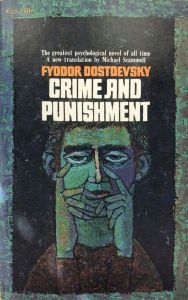
Get the Washington Square Press Scammell translation of Crime and Punishment
Includes an introdction by Michael Scammell and a selected bibliography. 596 pages. No ISBN. Product number w-721. This book is out of print. You may be able to find a used copy for sale online using the links below.
Available as a mass-market paperback.
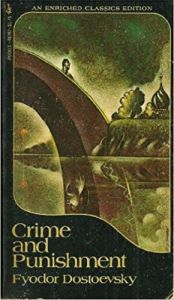
Get the Washington Square Enriched Classics Scammell translation of Crime and Punishment
1976 edition. Reader's supplement prepared under the supervision of an editorial committee directed by Harry Shefter. Introduction by Michael Scammell. This book is out of print. You may be able to find a used copy for sale online using the links below.
Available as a mass-market paperback (ISBN 9780671487874, 574 pages).
Who was Sidney Monas?
Sidney Monas sounds like an amazing guy. An American Jew, he was captured and thought to have died in World War II but survived, returned, and took up academic life in Princeton, and went on to earn a PhD from Harvard. Not bad for a dead guy! He died for real in 2019 at the age of 94.
People don’t seem to talk much about his translation of Crime and Punishment, even though it’s still in print. His version is mentioned in some of the articles about newer versions, but nobody seems to champion it.
Extract from the Monas translation of Crime and Punishment
Early one evening, during an exceptional heat wave in the beginning of July, a young man walked out into the street from the closetlike room he rented on Stoliarny Place. Slowly, as though he could not make up his mind, he began to move in the direction of the Kokushkin Bridge.
He had managed to avoid meeting his landlady on the stairs. He lived practically under the roof of a five-floor house, in what was more a cupboard than a room. In an apartment one flight below lived his landlady, from whom he rented this garret, dinner and service thrown in. Every time he went out he had to pass her kitchen door, which almost always stood open facing the stairs. When he walked past, he felt a nauseous, cowardly sensation; it made him wince, and he was ashamed of it. He was deeply in debt to his landlady, and he feared meeting her.
Not that he was cowardly or abject; quite the contrary. For some time, though, he had been tense and irritable, in a state resembling acute depression. He had plunged so far within himself, into so complete an isolation, that he feared meeting not only his landlady but anyone at all. He had lately ceased even to feel the weight of the poverty that crushed him. He had completely lost interest in his day-today affairs, and he had no wish to recover such interest. It was not landladies he feared, no matter what this one happened to be plotting against him.
To find himself stuck on the stairs, though, and forced to listen to the whole range of her nonsense and offensive rubbish for which he had absolutely no concern; forced to listen to her pesterings for payment, her threats, her appeals; and he himself all the while prevaricating, making excuses, lying . . . No. Better somehow to slink down the stairs like a cat and slip away unseen.
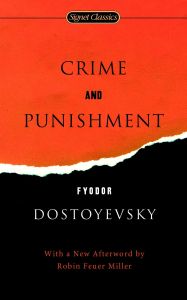
Get the Signet Classics Monas translation of Crime and Punishment
Includes an introduction by Leonard Stanton and James D. Jr. Hardy, a translator's preface, an afterword by Robin Feuer Miller, a reading guide (online)
Available as a mass market paperback (ISBN 9780451530066, 560 pages).
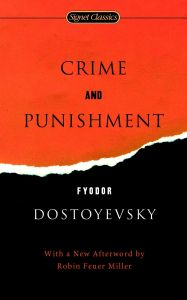
Get the Signet Classics Monas translation of Crime and Punishment
Includes an introduction by Leonard Stanton and James D. Jr. Hardy, a translator's preface, an afterword by Robin Feuer Miller, a reading guide (online)
Available as an ebook (ISBN 9781101142318).
Who is Julius Katzer?
I can’t find anything about him online. I keep running into my own Crime and Punishment information pages when I Google. He also translated The Brothers Karamazov.
About the Katzer translation of Crime and Punishment
It was published by Raduga Publishers, a Soviet-era publishing house, in Moscow in 1985 and 1989.
Extract from the Katzer translation of Crime and Punishment
It was towards evening on a sweltering day early in July that a young man left the cubicle sublet to him in S— Lane, went out into the street and, with slow and somewhat irresolute steps, made for K— Bridge.
He had been lucky enough to escape meeting his landlady on the staircase. Located in the attic of a tall five-storey house, his cubicle was more of a cupboard than a place to live in. The woman who sublet the cubicle, with a daily meal and some service thrown in, lived in a flat
See screenshot of the Katzer extract.
(A short extract, but better than nothing!)
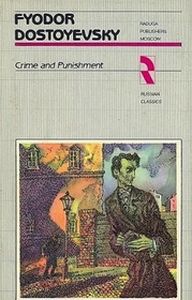
Get the Raduga Katzer translation of Crime and Punishment
ISBN 9785050000149, 584 pages. This book is out of print. You may be able to find a used copy for sale online using the links below.
Available as a hardcover.
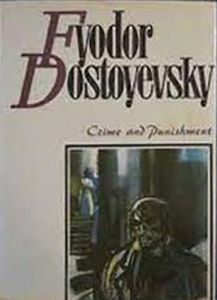
Get the Raduga Katzer translation of Crime and Punishment
ISBN 9785050000149, 584 pages. This book is out of print. You may be able to find a used copy for sale online using the links below.
Available as a hardcover.
Who is David McDuff?
David McDuff is a British translator of Russian and Scandinavian poetry and prose, an editor and a literary critic. Penguin published his translations of Dostoevsky’s The Brothers Karamazov and The Idiot.
Penguin is a publishing powerhouse, so you’ll be in good company whether you choose the McDuff version or the Oliver Ready one. Older Penguin editions were translated by David Magarshack.
About the McDuff translation of Crime and Punishment
- New York Times: “Raskolnikov Says the Darndest Things” by Richard Lourie
“Mr. McDuff’s Dostoyevsky survives its too frequent lapses and its too frequent notes.” - Commentary Magazine: “How to Read Crime and Punishment” by Gary Morson
“When one embarks on translating a classic that has been rendered many times before, one should have a well-formed reason to serve as a guide in making choices. David McDuff seems to have no reason except to produce yet another translation.”
Extract from the McDuff translation of Crime and Punishment
At the beginning of July, during a spell of exceptionally hot weather,1 towards evening, a certain young man came down on to the street from the little room he rented from some tenants in S— Lane and slowly, almost hesitantly, set off towards K—n Bridge.2
He had succeeded in avoiding an encounter with his landlady on the stairs. His room was situated right under the roof of a tall, five-storey tenement,3 and sooner resembled a closet than a place of habitation. His landlady, from whom he rented this room with dinner and a maid, lived on the floor below in a separate apartment, and each time he wanted to go down to the street he had to pass his landlady’s kitchen, the door of which was nearly always wide-open on to the stairs. And each time, as he passed it, the young man had a morbid sensation of fear, of which he was ashamed and which caused him to frown. He was heavily in debt to his landlady, and was afraid of running into her.
Not that he was particularly timid or cowed — quite the opposite, indeed; but for some time now he had been in a tense, irritable state of mind that verged upon hypochondria. So absorbed in himself had he grown, so isolated from everyone else, that he was actually afraid of meeting anyone at all, not simply his landlady. He had been crushed by poverty; but even his reduced circumstances had of late ceased to be a burden to him. His vital interests no longer concerned him; he did not even wish to think about them. As a matter of fact, no landlady on earth had the power to make him afraid, whatever she might be plotting against him. But to have to stop on the stairs and listen to all that mediocre rubbish that had nothing whatsoever to do with him, all those pestering demands for payment, those threats and complaints, and be compelled in response to shift his ground, make excuses, tell lies — no, it was better to slink down the stairs like a cat and steal away unseen by anyone.

Get the Penguin Classics McDuff translation of Crime and Punishment
Includes an introduction, list for further reading, a note on translation, a note on money, endnotes, a reading guide (online)
Available as a paperback (ISBN 9780140449136, 718 pages).
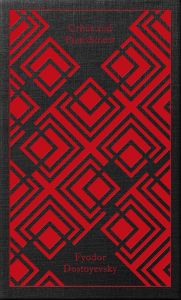
Get the Penguin Clothbound Classic McDuff translation of Crime and Punishment
Cover designed by Coralie Bickford-Smith in black/red.
Available as a hardcover (ISBN 9780241347683, 720 pages).
Who are Pevear and Volokhonsky?
Pevear and Volokhonsky are an American/Russian husband-and-wife team with a huge list of Russian translations, including The Master and Margarita, War and Peace, The Brothers Karamazov, The Idiot, and Demons to their credit. They became widely known in the US when Oprah chose their version of Anna Karenina for her book club.
There is a LOT of chatter about Pevear and Volokhonsky. Their translations are popular but produced a strong backlash. Their style is characterized as being either “admirably accurate” or “too literal”. I’m not positively inclined towards their version; I have the sense that their stuff has been over-hyped.
You can get an audiobook of Crime and Punishment that is made from the Pevear and Volokhonsky translation.
About the Pevear and Volokhonsky translation of Crime and Punishment
- New York Times: “Raskolnikov Says the Darndest Things” by Richard Lourie
“The version presented by Mr. Pevear and Ms. Volokhonsky does not cover the full distance to English. The way to preserve some of Dostoyevsky’s roughness is not by publishing a rough draft.” - The New Yorker: “The Translation Wars”
“Pevear and Volokhonsky may be the premier Russian-to-English translators of the era. They are certainly the most versatile and industrious…. [They] agree with the majority of their critics that they are best at Dostoyevsky.” - The Washington Post: “The Desperate Hours” by Michael Dirda
“I first read Crime and Punishment (in Constance Garnett’s translation) some 30 years ago when my mother had to tear the book from my grasp to send me to bed. I’ve reread the novel three more times since, and in this translation by Pevear/Volokhonsky it is better than ever.” - Commentary Magazine: “The Pevearsion of Russian Literature” by Gary Morson
“It looks as if people will be reading P&V, as they have come to be called, for decades to come. This is a tragedy, because their translations take glorious works and reduce them to awkward and unsightly muddles.” - Commentary Magazine: “How to Read Crime and Punishment” by Gary Morson
“Pevear and Volokhonsky have a very definite idea of what they are doing. They want to capture all those colloquialisms, slang expressions, and low tonalities that Garnett smoothed out. Generally speaking, they succeed quite well.” - TLS: “Who-knows-he-dunnit?” by Donald Rayfield
“Richard Pevear and Larissa Volokhonsky seem to follow the Byzantine principle of producing a translation from which the original, if it were ever lost, might be reconstituted word by word.”
Extract from The Pevear and Volokhonsky translation of Crime and Punishment
AT THE BEGINNING of July, during an extremely hot spell, towards evening, a young man left the closet he rented from tenants in S—y Lane, walked out to the street, and slowly, as if indecisively, headed for the K—n Bridge.
He had safely avoided meeting his landlady on the stairs. His closet was located just under the roof of a tall, five-storied house, and was more like a cupboard than a room. As for the landlady, from whom he rented this closet with dinner and maid-service included, she lived one flight below, in separate rooms, and every time he went out he could not fail to pass by the landlady’s kitchen, the door of which almost always stood wide open to the stairs. And each time he passed by, the young man felt some painful and cowardly sensation, which made him wince with shame. He was over his head in debt to the landlady and was afraid of meeting her.
It was not that he was so cowardly and downtrodden, even quite the contrary; but for some time he had been in an irritable and tense state, resembling hypochondria. He was so immersed in himself and had isolated himself so much from everyone that he was afraid not only of meeting his landlady but of meeting anyone at all. He was crushed by poverty; but even his strained circumstances had lately ceased to burden him. He had entirely given up attending to his daily affairs and did not want to attend to them. As a matter of fact, he was not afraid of any landlady, whatever she might be plotting against him. But to stop on the stairs, to listen to all sorts of nonsense about this commonplace rubbish, which he could not care less about, all this badgering for payment, these threats and complaints, and to have to dodge all the while, make excuses, lie—oh, no, better to steal catlike down the stairs somehow and slip away unseen by anyone.
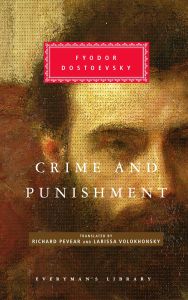
Get the Everyman's Library Pevear and Volokhonsky translation of Crime and Punishment
Includes an introduction by W. J. Leatherbarrow, a bibliography, a chronology, a translator's note, endnotes.
Available as a hardcover (ISBN 9780679420293, 608 pages).
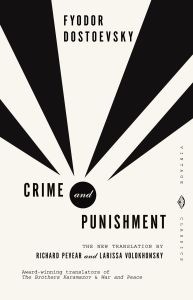
Get the Vintage Pevear and Volokhonsky translation of Crime and Punishment
It includes a foreword, translators' note and endnotes.
Available as a paperback (ISBN 9780679734505, 565 pages).
Who is Oliver Ready?
Oliver Ready is a British translator. His version of Crime and Punishment, his first translation of a classic work, seems well respected; some people seem to consider it the best thing since sliced bread. Personally, I don’t like either of the current covers, and I think I prefer the older, smoother sound of Garnett to this newer but supposedly more authentically “jagged” language Ready uses.
If you like audiobooks, there’s an audiobook of the Oliver Ready translation of Crime and Punishment.
About the Oliver Ready translation of Crime and Punishment
- The Spectator: “This new translation of Crime and Punishment is a masterpiece” by A.N. Wilson
“[The] knife-edge between sentimentality and farce has been so skilfully and delicately captured here. A truly great translation.” - Los Angeles Review of Books: “All Is Permitted, All Over Again” by Boris Dralyuk
“[I]t is Ready’s grander success that ought to be applauded, his ability to reproduce the whole heady brew of Dostoyevsky’s novel in a consistent but nimble modern English.” - The Wichita Eagle: “Translation of Dostoyevsky’s ‘Crime and Punishment’ brings vitality, verve to classic novel”
“Now comes Oliver Ready’s vivid, new version of the book, promising to adhere more faithfully to the jagged, repetitive rantings inside Raskolnikov’s head and to keep the novel’s language at an even, modern keel, not too dated but not too hip.” - Russia Beyond: “Dostoevsky’s cacophonic catastrophes” by Oliver Ready
“Ready… chose not to use 19th century English or contemporary language. Instead, his vocabulary belongs somewhere in the middle of the 20th century, and he tries to avoid words that appeared after the 1960s. This makes the new translation’s language ‘modern, but not contemporary.’” - Podularity: “Conversations with Oliver Ready on Crime and Punishment” by George Miller
“[W]hat persuaded him to take the project on? how did he limber up for it? and why — unusually — did he write his version out longhand rather than work on a computer?” - The Nation: Floating in the Air by Jennifer Wilson
“Published in 2014 by Penguin, Ready’s Crime and Punishment was praised for its preservation of Dostoyevsky’s humor, a welcome relief in a novel whose mixture of emotional intensity, philosophical speculation, and gruesome realism can at times be dizzying.”
Extract from The Oliver Ready translation of Crime and Punishment
In early July, in exceptional heat, towards evening, a young man left the garret he was renting in S—y Lane, stepped outside, and slowly, as if in two minds, set off towards K—n Bridge.1
He’d successfully avoided meeting his landlady on the stairs. His garret was right beneath the eaves of a tall, five-storey building and resembled a cupboard more than it did a room. His landlady — a tenant herself, who also provided him with dinner and a maid — occupied separate rooms on the floor below, and every time he went down he had no choice but to pass her kitchen, the door of which was nearly always wide open. And every time he passed it, the young man experienced a sickening, craven sensation that made him wince with shame. He owed his landlady a small fortune and he was scared of meeting her.
Not that he was really so very craven or browbeaten — far from it; bur for some time now he’d been in an irritable, tense state of mind not unlike hypochondria.2 He’d become so self-absorbed and so isolated that he feared meeting anyone, not just his landlady. He was being suffocated by poverty; yet lately even this had ceased to bother him. He’d entirely abandoned — and had no wish to resume — his most pressing tasks. And he couldn’t really be scared of a mere landlady, whatever she might be plotting, But to stop on the stairs, to listen to her prattle on about everyday trivia that meant nothing to him, and pester him about payments, threaten and whine, while he had to squirm, apologize and lie — no, better to slink past like a cat and slip out unnoticed.
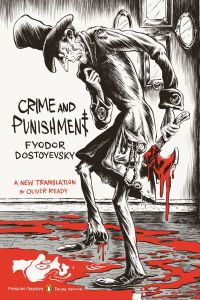
Get the Penguin Deluxe Ready translation of Crime and Punishment
It includes wrap-around cover art by Zohar Lazar, an introduction, a chronology, a list for further reading, a note on translation, a list of characters, note on names, a preface to notes and notes.
Available as a paperback (ISBN 9780143107637, 608 pages).
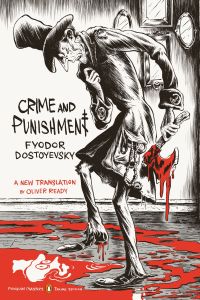
Get the Penguin Ready translation of Crime and Punishment
It includes a note on the translation, a note on names, a list of characters, a chronology, an introduction, a preface to the notes, endnotes, a list for further reading.
Available as an ebook (ISBN 9780698194151).

Get the Penguin Ready translation of Crime and Punishment
It includes a note on the translation, a note on names, a list of characters, a chronology, an introduction, a preface to the notes, endnotes, a list for further reading.
Available as a paperback (ISBN 9780141192802, 752 pages).
Who is Nicolas Pasternak Slater?
Nicholas Pasternak Slater is the nephew of Russian novelist Boris Pasternak, author of Doctor Zhivago, and has translated Doctor Zhivago into English for The Folio Society. He was raised bilingual and has a degree in Russian literature from Oxford. He began translation work after retiring from a career as a medical doctor.
About the Slater translation of Crime and Punishment
- TLS: “Who-knows-he-dunnit?” by Donald Rayfield
“[If] a choice is needed then Pasternak Slater probably takes precedence over Katz: the Oxford University Press edition is beautifully produced and competitively priced, and Sarah J. Young has given it a better introduction and notes.” - Bloggers Karamazov: “Translating Crime and Punishment”
“In this series of posts, Bloggers Karamazov sits down with the translators to talk about the experience of translating Dostoevsky’s most famous novel.”
Extract from the Slater translation of Crime and Punishment
ONE evening in early July, during a spell of exceptionally hot weather,* a young man came out of the garret he rented from the tenants of a flat in S— Lane, went downstairs to the street and set off, slowly and rather uncertainly, towards K—n Bridge.*
He managed to avoid meeting his landlady on the stairs. His garret, more like a cupboard than a room, was just under the roof of the five-storey house. The landlady from whom he rented this garret, with service and one meal a day, lived in a separate flat on the floor below, and every time he went downstairs to the street he had to go past her kitchen, whose door was almost always open onto the stairway. And every time the young man passed this door, he was overcome by an uncomfortable, cowardly feeling which made him grimace with shame. He was hopelessly in debt to his landlady and afraid of meeting her.
Not that he really was so timid and cowardly; quite the reverse. But recently he had been in a tense, irritable frame of mind, almost like hypochondria. He had retreated so deeply into himself, withdrawn so completely from everyone else, that he not only feared meeting his landlady—he feared meeting anybody. He was crushed by his poverty; yet lately even his impoverished condition had ceased to weigh him down. He had completely given up managing, or wishing to manage, his day-to-day affairs. He wasn’t actually afraid of any landlady, whatever she might be plotting against him. But stopping on the stairway to listen to all sorts of rubbish, everyday stuff that was none of his business, all that pestering about the rent, and threats, and complaints, and having to prevaricate and apologize and tell lies—no, better slip away downstairs like a cat, and make his escape unseen.
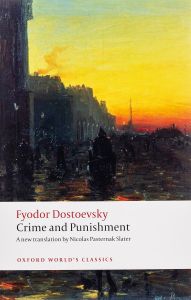
Get the Oxford World's Classics Slater translation of Crime and Punishment
It was edited by Sarah J. Young and includes: an introduction, a note on translation, a note on table of ranks, a bibliography, a chronology, a map of St Petersburg, a list of characters, notes.
Available as a paperback (ISBN 9780198709718, 544 pages).
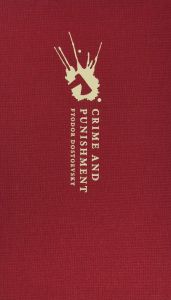
Get the Oxford World's Classics Slater translation of Crime and Punishment
It was edited by Sarah J. Young and includes: an introduction, a note on translation, a note on table of ranks, a bibliography, a chronology, a map of St Petersburg, a list of characters, notes.
Available as an ebook (ISBN 9780198707753).
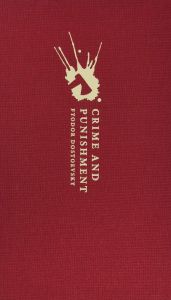
Get the Oxford World's Classics Slater translation of Crime and Punishment
It was edited by Sarah J. Young and includes: an introduction, a note on translation, a note on table of ranks, a bibliography, a chronology, a map of St Petersburg, a list of characters, notes.
Available as a hardcover (ISBN 9780198709701, 544 pages).
Who is Michael R. Katz?
Michael Katz is an Emeritus Professor of Russian and East European Studies and the translator of over a dozen Russian novels, including Devils (Demons). His translation is the newest of the whole batch. I’m impressed by the wealth of features in the Norton Critical Edition; the branding of the Liveright edition points to accessibility.
About the Katz translation of Crime and Punishment
- Bloggers Karamazov: “Translating Crime and Punishment”
“In this series of posts, Bloggers Karamazov sits down with the translators to talk about the experience of translating Dostoevsky’s most famous novel.” - The Nation: “Floating in the Air” by Jennifer Wilson
“Katz has added something with his own translation: Hoping to accentuate what he calls the novel’s “richness of registers or tones,” he pays specific attention to how Dostoyevsky’s characters alternate between religious solemnity and drunken vulgarity. The new work also has an American simplicity and informality that sets it apart from Ready’s more elegant British rendering.”
Extract from The Katz translation of Crime and Punishment
In the beginning of July, during an extremely hot spell, toward evening, a young man left his tiny room, which he sublet from some tenants who lived in Stolyarnyi Lane, stepped out onto the street, and slowly, as if indecisively, set off towards the Kokushkin Bridge.
He had successfully managed to avoid meeting his landlady on the staircase. His small room, more like a closet than an apartment, was tucked under the roof of a tall five-story building. The landlady of the apartment, who rented him this room and provided both dinner and a servant, lived below in a separate apartment on the same staircase; every time he left to go out, he had to pass the landlady’s kitchen door, which was almost always left open onto the landing. Every time the young man passed, he felt a painful and fearful sensation, one that he was ashamed of and that made him wince. He was deeply in debt to the landlady and was afraid to face her.
It wasn’t that he was so fearful and cowed; in fact, it was just the opposite; but for some time he had been in an irritable and anxious state, similar to hypochondria. He had become so absorbed in himself and so isolated from others that he was afraid of meeting anyone, not only his landlady. He was crushed by poverty, but even his constrained circumstances had ceased to burden him of late. He had completely stopped handling his own everyday affairs and didn’t wish to deal with them. He was not actually afraid of his landlady, no matter what she intended to do to him. But to stop on the staircase, put up with all sorts of nonsense about ordinary rubbish that didn’t concern him at all, her constant pestering about payment, her threats and complaints, and, in the face of it all, to have to dodge her, make excuses, tell lies—no thank you; it was better to slip past somehow, like a cat on a staircase, and steal away unnoticed.

Get the Norton Critical Edition Katz translation of Crime and Punishment
Includes a preface; a list of characters; a map, material from the authors notes, letters, and drafts; 26 critical essays; a chronology, serialization, a bibliography.
Available as a paperback (ISBN 9780393264272, 576 pages).

Get the Norton Critical Edition Katz translation of Crime and Punishment
Includes a preface; a list of characters; a map, material from the authors notes, letters, and drafts; 26 critical essays; a chronology, serialization, a bibliography.
Available as an ebook (ISBN 9780393270167).
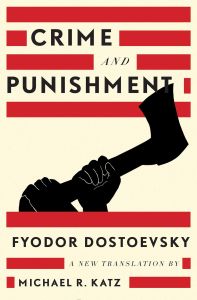
Get the Liveright Katz translation of Crime and Punishment
Includes an introduction, note on the translation, list of characters, note on characters' names.
Available as a hardcover (ISBN 9781631490330, 621 pages).
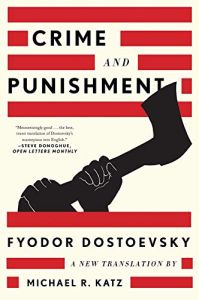
Get the Liveright Katz translation of Crime and Punishment
Includes an introduction, note on the translation, list of characters, note on characters' names.
Available as a paperback (ISBN 9781631495311, 621 pages).

Get the Liveright Katz translation of Crime and Punishment
Includes an introduction, note on the translation, list of characters, note on characters' names.
Available as an ebook.
Who is Roger Cockrell?
Roger Cockrell is a writer, translator, and British scholar specializing in Russian literature. He translated Dostoevsky’s Devils, The House of the Dead, and Uncle’s Dream for Alma Classics. He has also translated works by Bulgakov, Gogol, Tolstoy and Chekhov.
About the Cockrell translation of Crime and Punishment
Available as of July 4, 2022.
Extract from Cockrell translation of Crime and Punishment
TOWARDS EVENING on an exceptionally hot day* at the beginning of July, a young man emerged from his garret room on S— Lane, where he was lodging, and went out into the street. Slowly, as if undecided what to do, he set off for K—n Bridge.*
He managed to avoid meeting his landlady on the stairs. His little room was at the very top of a tall five-storey building, and was more like a cupboard than an apartment. His landlady, from whom he was renting his room together with food and service, lived one staircase below, in her own apartment. This meant that every time he had to go down to the street, he had to walk past her kitchen, with its door almost always wide open onto the staircase. And every time the young man walked past the kitchen, he felt sick with apprehension — something which made him grimace with shame. He was deeply in debt to her, and was afraid of meeting her.
It wasn’t so much that he was a cowardly, downtrodden figure — quite the opposite in fact. It was just that, for some time now, he had been in an irritable and overwrought state, close to hypochondria.* He had become so absorbed with himself, so distanced from everyone else, that he was afraid to meet anybody, let alone his landlady. Although crushed by poverty, he had recently found that even his straitened circumstances had no longer become a burden to him. He had totally stopped engaging in essential day-to-day concerns, or wanting to do so. In actual fact, he wasn’t afraid of any landlady, whatever she might be threatening him with. But to have to wait on the staircase and listen to all that drivel about all kinds of banal rubbish that didn’t interest him in the slightest, all that pestering for money, all those threats and complaints, combined with the need to prevaricate, to apologize, to lie — no, he’d rather slink past down the stairs like a cat and slip out into the street without anyone noticing.
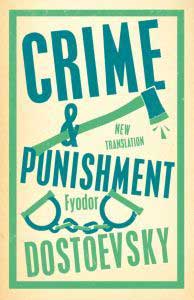
Get the Alma Classics Cockrell translation of Crime and Punishment
Includes an introduction and translator's note by Roger Cockrell, a map of St Petersburg c. 1860, a table of ranks, a list of characters, a note on the text, endnotes, a 12-page biography of Dostoevsky, ten pages on his works, and a select bibliography.
Available as a paperback (ISBN 9781847498830, 720 pages).
Get the Garnett translation of Crime and Punishment Free
If you don’t want to spend a lot of time on the decision process, probably any translation would be fine.
Crime and Punishment [is] a story with a power that bursts through any English version. — Washington Post
Personally I am convinced of the virtue of the Garnett translation, not simply because it is abundant and cheap or even free, or because that’s the one I read (which it was). Generations of readers have accessed Russian classics by means of Garnett’s translations; they are, themselves, classics.
Download free from Standard Ebooks

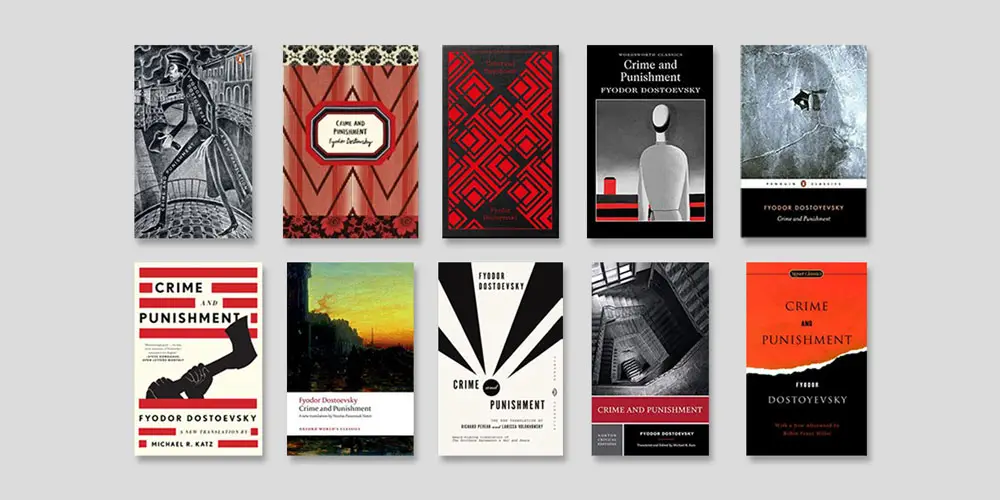
I have finally settled on Oliver Ready’s translation as a “second opinion” or “backup” (if this makes any sense) because I read nothing but positive reviews about his work, but after coming across this article and reading the intro, I’m not so sure anymore “In early July, in exceptional heat, towards evening, a young man […]” this doesn’t sound good :’(( it’s not flowing properly and all those commas, it’s like break, break, break, it almost gives you a nauseating sensation. Now I’m more conflicted than ever, because I wanted to get the Garnett translation as a primary source but also another one, just for analogy’s sake. I guess I’ll be postponing my reading of Crime and Punishment.
Hi- this is amazing. My daughter wants to read this in high school. I told her I would buy it. What would you recommend as a straightforward, easy to grasp translation? I was looking into Pevear but figured I’d ask. Thanks!
Hi Dena! Good for you for supporting your daughter’s desire to tackle a classic Russian novel!
Currently the voting page here at We Love Translations recommends these as the top 4:
Pevear/Volokhonsky 154 votes
Ready 112 votes
Garnett 68 votes
Katz 68 votes
Pevear and Volokhonsky’s version has been criticized as not smooth, but it’s still the most popular, so maybe the criticism is exaggerated.
Ready’s version is also well liked. This is an elegant British version.
Garnett’s version is the one I like, because it’s a groundbreaking classic in its own right. The language might sound a little old fashioned.
Katz’s version is the newest. One review says it “has an American simplicity and informality”.
Hope this helps!
I’ve always wondered why so many people think of Dostoevsky as this overly religious, serious, and depressing reading. I could never quite understand why, and I used to think it might just be down to the difficulty of translation. Sure, in some ways it is, but he’s also got this incredible taste for humor and a very vivid sense of sarcasm.
Being Russian, I read foreign classics in translation, only being able to revisiting some of them once my English proficiency allowed me to do so. (so I can fully understand the struggle at this poin)
Then, one day, I borrowed a friend’s book and from the second page onwards, I found myself itching to grab a pencil and start jotting down notes and remarks. It was Constance Garnett’s translation. Now, with all due respect, she translated much more than I probably ever will, but I can’t really recommend her version to anyone. It felt completely flat and boring, devoid of any humor, and riddled with mistakes or just plain skipped parts.
So, long story short, ended up here on this site, curious about other translations and wanted to know if there were any better options out there
Thank a lot to the host of this site, it’s very helpful!
Maybe someone will find my comment helpful at some point
What do you think is the closest translation that reflects more of his humor and sarcasm?
Did you find a better version? I’m completely lost trying to decide which one to buy. It’s my first time to read Dostoyevsky and I don’t want to spoil it.
This was a wonderful service! I purchase for a library system and it’s so nice to have the same passages to quickly compare. Thank you!
My pleasure. Thanks so much for the positive feedback, CJ!
Is there a reason for many of the versions abbreviating terms in the example passages “S—Lane” and “K—n Bridge?” Is this a common feature? It feels weird to completely take out the Russian names that I presume were included in the original. Do you feel one way or another about keeping or axing place names?
Actually, the original Russian text was missing the specific place names. Other authors have written this way as well. I assume this vague way of naming places is intended to indicate that the places referred are meant to be thought of as fictional (even if they actually correspond to real places).
Pevear & Volokhonsky’s translators’ note says “Often, though not consistently, Dostoevsky blanks out the names of specific streets and other topographical points. Scholars armed with maps have traced Raskolnikov’s movements around the city and discovered the missing names, which some translators have then inserted into their versions of the novel. We have consistently followed Dostoevsky’s inconsistency here, assuming it had an artistic purpose.”
One of David McDuff’s notes says “The omission of part of the names here, as elsewhere in the text, was done by Dostoyevsky in order to placate the censor.”
What might McDuff mean by “placate the censor.”?
And would you recommend the McDuff translation?
One of David McDuff’s notes says “The omission of part of the names here, as elsewhere in the text, was done by Dostoyevsky in order to placate the censor.” That might mean Dostoevsky was worried that the government would not approve the publication of his novel or would force him to make changes if he used the real names of places. Or it might mean the government actually did object and ask him to conceal the real names of places. I’m not sure.
You’ll have to decide for yourself if the McDuff translation is the one that would suit you best. I think different translations appeal to different people for different reasons.
It’s been a while since I took 19th century lit at uni, but I do remember that blanking place names, or even personal names, was a common practice in both journalism and literary works during the 19th century. The reasons for it varied. Often, particularly for journalists, it was to protect the people who lived in or frequented those places. If, say, a heinous crime occurred and a journalist reported that Mr Smith living in Grosvenor Street had robbed a house, some idiot in the public could get the idea to visit vengeance upon a Mr Smith in Grosvenor Street, without verifying he had the right Mr Smith. Or, it was to insure that the paper wouldn’t face a lawsuit of accusing a Mr Smith of a crime it turned out he didn’t commit, after all.
Sometimes local law required the blanking, but, most of the time to protect the innocent; even without the law, many newspapers followed the same practice because it was considered the ‘polite’ thing not to provide too many specifics in articles that could have negative consequences for an individual or group of people.
Novelists who based their works on actual events would often follow the same practice, for similar reasons. The blanking masks any real persons they were writing about…to spare themselves a potential lawsuit. Sometimes the law required blanking out actual place names, but, most of the time, writers did it because that was how things were done back then.
Where literary writers diverged from reporters with blanking places names is when they wanted to lend verisimilitude to their work by imitating the newspaper style of the day. The story would feel like it was coming from a real reporter’s pen, rather than from an author’s imagination, which could give a particular type of tale more impact. Even now, we have novelists who imitate the writing style of newspapers for the same reason–to make their stories grab the reader in a particular way. Think about it: Newspaper writing has an immediacy and urgency to it that can have a powerful impact on drawing us in and keeping our attention focused on it, when it’s done well.
This last reason, if I recall correctly, is why Dostoevsky blanked place names: to evoke that ‘developing story’ feel from newspapers. That makes perfect sense for a novel about crime and punishment, because who has always written the most about those things? Reporters!
What do think about the
Penguin classics David mcDuff(I am thinking of buying this one)
Peaver&volokhonsky one
And which one better
My impression of McDuff’s translations, from research on other titles, is that his style is literal and wordy. Pevear & Volokhonsky seems to be the most popular translation, although that doesn’t necessarily make it the best. People often characterize their style as being literal as well.
Do you yourself recommend one? Thanks!
I think if I were going to read it again, I’d try the one by Nicholas Pasternak Slater.
Having read the Sidney Monas one because that was what was at hand, I feel this one probably does not get the credit it deserves. I found it very easy to read and it flowed nicely.
I’ve read C & P quite a bit, a few times the Pevear Volokhonsky one. Am currently reading the Ready one, after I think switching back to the PV one after not being thrilled with it before, which isn’t to say I’m exalting PV as perfect. There’s things about Ready’s though that again now put me off, one thing coming to mind is Razumikhin getting irate about other people’s “fibbing” – which he repeats several times,and of course this is very much in the everyday street environment. To choose that fibbing over “lying” just seems way off and pretty ridiculous seeing as in my whole life I doubt I’ve heard that word ever used. It robs the scene or conversation of plausible reality. I’m obviously not staking my whole criticism on that one word, but just that one example weakens my faith in the translation as a whole, or mindset of the translator.
Hi Andrew, thanks for sharing your experience! “Fibbing” does strike me as a distracting word choice. To me “fib” sounds like the word a child would use to rationalize a small lie, not something an adult would get upset with other adults about. Maybe the choice was meant to give the word a kind of slangy emphasis… If you encounter other choices of Ready’s that seem particularly bold or unusual, please let us know!
I don’t understand the problem. For most English speakers, fib/fibbing aligns not with childishness but with ‘little white lie,’ and that is likely the interpretation Ready meant.
Maybe it’s a US thing to see fib/fibbing as childish rather than its original context of little white lie?
It’s definitely possible that it’s a US thing. Or it could be something that varies from person to person.
Wow, there are even more versions than I realized! I wish I could read Russian. It would solve all these problems. I have the Garnett one, but wasn’t sure if that would be best for a first time reader. I guess I will find out!
Thank you. This is very helpful.
There are a lot of great books out there in other languages… sadly it’s impossible to read them all as they were written. Luckily English is a language that many world classics have been translated into! Thanks for sharing your thoughts. Happy reading!